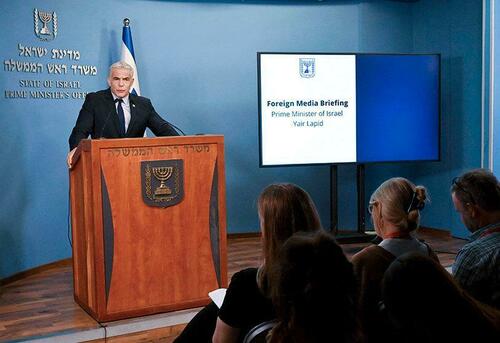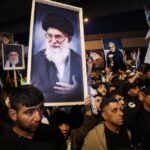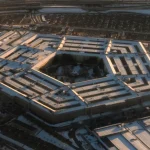
Prime Minister Yair Lapid on Thursday boasted that the Israeli pressure campaign with Washington over the Iran nuclear deal has had a positive effect in Israel's favor. Throughout the Vienna talks over the past year, Israel has consistently spoken out against what it sees as the "bad deal" of restoring the Joint Comprehensive Plan of Action (JCPOA). Israeli leaders have charged that it just buys more time for the Islamic Republic to secretly build a nuclear bomb.
"The Americans accepted a large part of the things that we wanted them to include in the drafts," Lapid told a press briefing Thursday. "It is a welcome change, and the dialogue with them is good and we will continue it." While telling the briefing that Israel has stepped up diplomatic intervention with the White House against an "unacceptable" final draft, he again stressed that "the current deal is a bad deal."

Currently, Iran has said it received Washington's response to revisions of the finalized text, but is still reviewing it; however, starting Wednesday there were unconfirmed reports out of Mideast regional media that the deal is unraveling based on Washington refusing additional Iranian requests. This remains to be seen on an official level at this point.
Starting all the way back in April at a moment Vienna talks had almost completely broken down, Tehran had touted that was enriching uranium to 60% purity, meaning it was well on its way to the 90% needed for weapons-grade if it wanted to, which of course pushed far past the original JCPOA constraints. This threat of quickly ramped up enrichment remains, making Israeli officials nervous.
Earlier this week Tel Aviv had dispatched Israeli national security adviser Eyal Hulata to Washington for "very intensive discussions" with Biden officials. Defense Minister Benny Gantz also arrived in the US Thursday to continue pressing Israel's perspective on the nuclear deal.
Per Lapid's remarks, Israel now sees these efforts as having born fruit. The Jerusalem Post-owned Walla! news outlet subsequently reported that the White House "hardened" its position:
Walla cited a senior Israeli official as saying that the US "hardened their position" in response to Iranian suggestions on the latest draft proposal of the nuclear deal being negotiated in Vienna between Tehran and world powers. The report also suggested that the series of public pronouncements emerging from Israel in recent days helped pressure the White House against making concessions.
The official told Walla that the US assured Hulata that it would not give in to Iranian demands over ending investigations by the International Atomic Energy Agency into its suspected nuclear activities nor would it lift sanctions on companies linked to Iran’s Islamic Revolutionary Guard Corps.
This is in reference to the current key hold-up in the final text of the agreement - namely that Iran has demanded that international inspections requirements be dropped. But both Israeli and US hawks see this as but an invitation to allow Iran to covertly violate JCPOA constraints.
Meanwhile, many have argued that if no restored Iran deal is put in place, this will ensure that Tehran and Washington (plus Israel) are put on the path to war...
The pro-war with #Iran crowd is really panicking about a potential US return to the Iran nuclear deal.
— Pouya Alimagham | پويا عالي مقام (@iPouya) August 24, 2022
That’s how you know the deal is good for averting another US war of choice.
Prime Minister Yair Lapid on Thursday boasted that the Israeli pressure campaign with Washington over the Iran nuclear deal has had a positive effect in Israel’s favor. Throughout the Vienna talks over the past year, Israel has consistently spoken out against what it sees as the “bad deal” of restoring the Joint Comprehensive Plan of Action (JCPOA). Israeli leaders have charged that it just buys more time for the Islamic Republic to secretly build a nuclear bomb.
“The Americans accepted a large part of the things that we wanted them to include in the drafts,” Lapid told a press briefing Thursday. “It is a welcome change, and the dialogue with them is good and we will continue it.” While telling the briefing that Israel has stepped up diplomatic intervention with the White House against an “unacceptable” final draft, he again stressed that “the current deal is a bad deal.”

Currently, Iran has said it received Washington’s response to revisions of the finalized text, but is still reviewing it; however, starting Wednesday there were unconfirmed reports out of Mideast regional media that the deal is unraveling based on Washington refusing additional Iranian requests. This remains to be seen on an official level at this point.
Starting all the way back in April at a moment Vienna talks had almost completely broken down, Tehran had touted that was enriching uranium to 60% purity, meaning it was well on its way to the 90% needed for weapons-grade if it wanted to, which of course pushed far past the original JCPOA constraints. This threat of quickly ramped up enrichment remains, making Israeli officials nervous.
Earlier this week Tel Aviv had dispatched Israeli national security adviser Eyal Hulata to Washington for “very intensive discussions” with Biden officials. Defense Minister Benny Gantz also arrived in the US Thursday to continue pressing Israel’s perspective on the nuclear deal.
Per Lapid’s remarks, Israel now sees these efforts as having born fruit. The Jerusalem Post-owned Walla! news outlet subsequently reported that the White House “hardened” its position:
Walla cited a senior Israeli official as saying that the US “hardened their position” in response to Iranian suggestions on the latest draft proposal of the nuclear deal being negotiated in Vienna between Tehran and world powers. The report also suggested that the series of public pronouncements emerging from Israel in recent days helped pressure the White House against making concessions.
The official told Walla that the US assured Hulata that it would not give in to Iranian demands over ending investigations by the International Atomic Energy Agency into its suspected nuclear activities nor would it lift sanctions on companies linked to Iran’s Islamic Revolutionary Guard Corps.
This is in reference to the current key hold-up in the final text of the agreement – namely that Iran has demanded that international inspections requirements be dropped. But both Israeli and US hawks see this as but an invitation to allow Iran to covertly violate JCPOA constraints.
Meanwhile, many have argued that if no restored Iran deal is put in place, this will ensure that Tehran and Washington (plus Israel) are put on the path to war…
The pro-war with #Iran crowd is really panicking about a potential US return to the Iran nuclear deal.
That’s how you know the deal is good for averting another US war of choice.
— Pouya Alimagham | پويا عالي مقام (@iPouya) August 24, 2022






